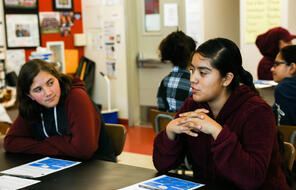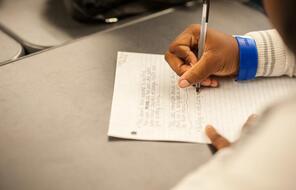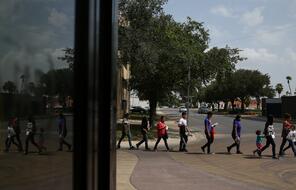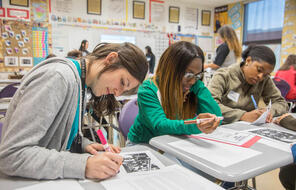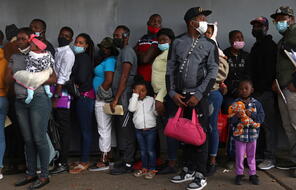Identity and Belonging (UK)
In his memoir Greetings from Bury Park, Sarfraz Manzoor writes about the experiences—in and out of school—that shaped his understanding of what it means to be British.
My father left Pakistan when he was twenty-nine but he never stopped being Pakistani. He came to Britain for economic reasons and his relationship to this country remained rooted in financial pragmatism rather than emotional attachment. ‘This is not your country,’ he would tell me, ‘you have to have your own language’.
I was brought up to believe that Pakistan was our true home and Britain merely where we happened to live. When we lived in Bury Park, it was an easy distinction to maintain; we lived around mostly Pakistanis, I went to a school that was mostly Pakistani and the only people who ever visited our home were Pakistanis. When we moved to Marsh Farm, that all changed.
At school I was just another schoolboy collecting Panini football stickers and stealing peeks at the girls doing handsprings in their knickers, but at home my parents were constantly reminding me I was Pakistani and different from my friends….
On the way to Lea Manor [his school], there was a subway where a gang of skinheads would hang out. They looked like glue sniffers and I knew they were trouble: a Sikh boy called Rupinder, who was one year below me at school, had told me of how the boys had spat on him as he tried to walk through the underpass. After he told me this story, I was always nervous about seeing the skinheads and changed my route to school. Not all racists were so easily identifiable. When I asked someone, for example, where the nearest bus stop was, and the lad pointed me in the wrong direction, I would know he was a racist: racists loved giving bad directions.
At Lea Manor there were very few Asian pupils and only one Asian teacher. His name was Mr. Judge and he taught maths. Mr. Judge was a short, plump, middle-aged man who wore a large turban, thick glasses and dressed in a brown suit, usually over a patterned sweater. Mr. Judge’s maths lessons were anarchic; each time he turned his back towards us, there would be a flurry of conkers hurled toward him. He vainly tried to discipline us, but his thick Asian accent meant no one took him seriously. Those of us who obeyed Mr. Judge did so as much out of sympathy as respect….
As we filed out of the room at the end of our maths lesson, I would see him tidying up his papers and rubbing the equations from the blackboard in advance of another class and, most likely, another grueling hour, and I used to wonder what it must have been like to be Mr Judge. But it wasn’t only pupils who could be hurtful. In woodwork, if I got my measurements wrong, the teacher would say, ‘I said five centimetres, not five chapattis.’
Another teacher who I was convinced was racist, began one lesson with a discussion about how words could be abbreviated. ‘So, for example, you, Sarfraz,’ he said, turning to me. I immediately began to feel the tingle of unwanted attention. ‘Now, you are Pakistani, are you not?’
’Yes, sir,’ I replied.
‘So if someone was [sic] to call you a Paki, and the term is a common shorthand for Pakistani, then it would be true to say you are a Paki, would it not?’
I could hear tittering in the class.
‘Yes, but no sir…it’s not just a shorter word, is it, sir…’ I said, trying to make my point.
‘All I’m saying, Sarfraz, is that technically, and only technically, mind, you are a Paki…would you agree?’
I looked straight at him. The more smug he looked, the more I hated him. ‘Yes sir,’ I replied finally.
It is not easy to convey the impact of such incidents…
‘What you have to remember,’ my father would tell me, ‘is that the whites don’t actually want you in this country. You do understand that, don’t you?…The reason I want you to speak Urdu and not forget you are Pakistani is that you never know when we might have to leave. It could happen. And if it does what will you do? If the Tories say they want to throw us all out, send us back home as they say, what will you do? Do you think your friends…will stand up for you? Take you into their home? Of course they won’t. That’s why I still keep our house in Pakistan. Open your ears when I tell you this: Pakistan is the only country that will never deny you. It is the only country that you can always call home.’
My father was always dismissive of my friends, I’m not sure he believed it was possible to be friends with a white person. But I knew differently. Scott was my best friend and he was white….
I wished me and Scott could have been actual brothers. If I could have summoned a genie who could have rubbed my brownness off, the shameful truth is that I would have been elated. As that was impossible, I settled on being invisible. That was how I felt being Pakistani in the eighties: I wanted to be invisible and anonymous so that no one could point at me and say: ‘You are different and you do not belong.’ 1
- 1Sarfraz Manzoor, Greetings from Bury Park: A Memoir (New York: Vintage Books, 2007), 240–55.




